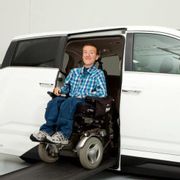Do's & Don'ts of Wheelchair Etiquette

Individuals use wheelchairs for a variety of reasons, including leg, torso, and spinal cord injuries, muscular dystrophy, multiple sclerosis, and age-related assistance. If a friend, family member, or coworker recently started using a wheelchair, take a moment to refresh your memory on related etiquette. Regardless of why they’re using a mobility aid, those in wheelchairs wish to be treated like everyone else.
Do:
Ask If Help Is Necessary First
Never assume that someone in a wheelchair needs your help. Ask if the individual would like your help first, particularly when they have to go over a threshold or get in and out of a vehicle. If they are a friend, family member, or someone you see every day, familiarize yourself with the equipment and machinery they often use.
Sit Down During a Long Conversation
 Sit down when you are speaking with someone in a wheelchair if the conversation is going to last more than five minutes. Eye-level conversations are much more comfortable and respectful for both parties. If a seat is unavailable, simply kneel down.
Sit down when you are speaking with someone in a wheelchair if the conversation is going to last more than five minutes. Eye-level conversations are much more comfortable and respectful for both parties. If a seat is unavailable, simply kneel down.
Engage the Person as Usual
Speak with the disabled individual as you would anyone else. This is especially important when the person is new to mobility aid use and more sensitive to biased treatment. As previously noted, equal treatment is of the utmost importance to many individuals in wheelchairs.
Don’t:
Touch the Wheelchair Unless Asked
Do not touch or hang on a wheelchair unless the individual using it says it’s okay. Touching the mobility aid without permission is a condescending act that the person may find hurtful. Unless you are helping with a ramp or wheelchair-accessible vehicle, keep your hands to yourself.
Assume the Person Is Sick or Helpless
Avoid assumptions about the disabled person, as the chair may not be permanent. Many people in wheelchairs are simply recovering from injuries or dealing with non-contagious diseases. Even for those that are permanently wheelchair-bound, assuming helplessness is another form of condescending behavior.
Forget About Wheelchair Ramps & Related Tools
Remember to mention where wheelchair ramps and related tools are located whenever you are giving directions. Give clear instructions that include the actual distance and any obstacles, such as a steep flight of stairs with no nearby ramps. Weather conditions should also be kept in mind.
Alaska Mobility has remained the leading handicapped equipment provider for Palmer, AK, and the surrounding areas since 2005. They specialize in wheelchair-accessible vehicles, ramps, lifts, and other mobility solutions, all of which are ADA-compliant. Delivery outside of the Anchorage area is available for your convenience. Call (907) 244-3550 to speak with a licensed, insured professional, or visit the website for additional mobility aid information.
About the Business
Have a question? Ask the experts!
Send your question

